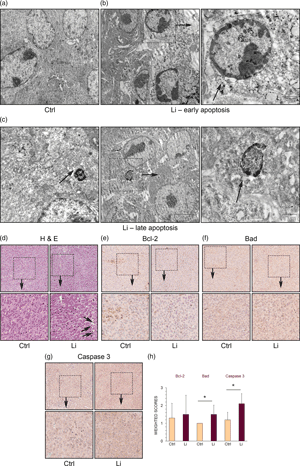Published online by Cambridge University Press: 20 May 2022

Lithium is an inhibitor of glycogen synthase kinase 3 beta, which is traditionally used in the treatment of bipolar disorders and has antitumor effects. The aim of the current study was to determine if lithium salt causes autophagy and apoptosis in skin melanoma cells to enhance cell death. Light microscopy, transmission electron microscopy, immunohistochemistry, and immunofluorescence were used to study the mechanism of action of lithium carbonate in B16 melanoma cells in vivo. Proliferating cell nuclear antigen immunofluorescence assay revealed that the proliferation of B16 melanoma cells was suppressed by lithium treatment for 7 days. Electron microscopy demonstrated a significant increase in the number of autophagic vacuoles in lithium-treated cells relative to control. In addition, levels of autophagy markers LC3 beta and LAMP1 found in lithium-treated tumor xenografts were higher than levels of these markers in the control tumors. Lithium induced caspase-3 expression and apoptotic cell death in tumor cells. Thus, lithium carbonate is the compound that inhibits cell proliferation and stimulates cell death in melanoma cells through induction of autophagy and apoptosis. Stimulation of autophagy by lithium could contribute to the development of autophagic cell death in tumor cells.